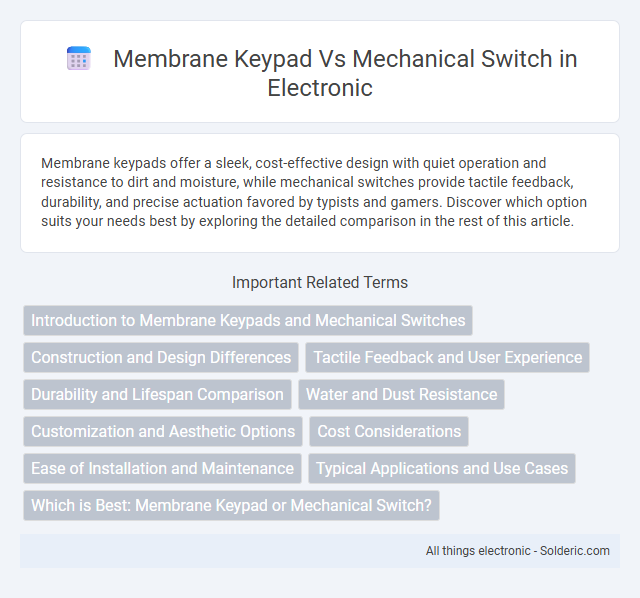Membrane keypads offer a sleek, cost-effective design with quiet operation and resistance to dirt and moisture, while mechanical switches provide tactile feedback, durability, and precise actuation favored by typists and gamers. Discover which option suits your needs best by exploring the detailed comparison in the rest of this article.
Comparison Table
| Feature | Membrane Keypad | Mechanical Switch |
|---|---|---|
| Construction | Flexible, layered plastic with pressure pads | Individual mechanical switches with moving parts |
| Typing Feel | Soft, quiet, less tactile feedback | Clicky, tactile, audible feedback |
| Durability | Low to medium, typically 1-5 million keystrokes | High, usually 50+ million keystrokes |
| Cost | Low-cost, budget-friendly | Higher cost, premium pricing |
| Maintenance | Harder to clean, sealed design | Easier to clean, replaceable switches |
| Use Case | Consumer electronics, remote controls, appliances | Gaming, professional typing, high-performance keyboards |
| Response Time | Slower, less precise actuation | Fast, precise key actuation |
Introduction to Membrane Keypads and Mechanical Switches
Membrane keypads use a flexible, flat surface with pressure pads that complete an electrical circuit when pressed, offering a sleek, spill-resistant design ideal for compact devices. Mechanical switches contain individual moving parts and springs beneath each key, providing tactile feedback and durability, favored in high-performance keyboards. Your choice depends on whether you prioritize quiet operation and low cost with membrane keypads or responsiveness and longevity with mechanical switches.
Construction and Design Differences
Membrane keypads feature a flexible, layered construction with a printed circuit beneath a thin, pressure-sensitive membrane, providing a flat and sealed surface ideal for spill resistance and quiet operation. Mechanical switches consist of individual, spring-loaded switches with moving parts that offer tactile feedback and higher durability, making them preferred for heavy typing or gaming use. Your choice depends on whether you prioritize the compact, low-profile design of membrane keypads or the robust, responsive feel of mechanical switches.
Tactile Feedback and User Experience
Membrane keypads provide a softer, quieter tactile feedback that can feel less responsive compared to mechanical switches, affecting overall typing precision and user satisfaction. Mechanical switches deliver distinct, audible clicks with crisp actuation points that enhance user experience by improving typing accuracy and sensory feedback. Users seeking enhanced tactile responsiveness and durability typically prefer mechanical switches for prolonged, intensive use.
Durability and Lifespan Comparison
Mechanical switches typically offer superior durability, with lifespans ranging from 50 to 100 million keystrokes due to their robust construction and individual switch mechanisms. Membrane keypads generally have shorter lifespans, averaging around 1 to 5 million keystrokes, as they rely on pressure pads and conductive traces that wear out faster. This significant difference in durability makes mechanical switches more suitable for high-use environments and prolonged daily typing.
Water and Dust Resistance
Membrane keypads offer superior water and dust resistance thanks to their sealed, flexible layers that prevent contaminants from entering, making them ideal for harsh environments. Mechanical switches, with their exposed moving parts, are more susceptible to damage from moisture and debris, requiring additional protective enclosures to maintain reliability. Choosing a membrane keypad ensures your device maintains consistent performance in wet or dusty conditions without extra protective measures.
Customization and Aesthetic Options
Membrane keypads offer extensive customization with smooth surfaces that can display intricate graphics and vibrant colors, enhancing Your device's aesthetic appeal. Mechanical switches provide a tactile, high-quality feel with limited visual customization but excel in durability and typing experience. Choosing between the two depends on whether You prioritize sleek design flexibility or robust, tactile feedback for Your application.
Cost Considerations
Membrane keypads typically offer lower production costs due to their simpler design and fewer materials, making them ideal for budget-sensitive applications. Mechanical switches incur higher expenses because of intricate individual components and durability features, which increase manufacturing costs. Choosing between them depends on balancing initial investment against long-term performance and application requirements.
Ease of Installation and Maintenance
Membrane keypads offer easier installation and low maintenance due to their flat, single-layer design with fewer moving parts, reducing the risk of mechanical failure and debris accumulation. Mechanical switches require precise mounting and regular cleaning to prevent key jamming and ensure reliable performance, often involving more complex disassembly and replacement of individual components. The simplicity of membrane keypads makes them ideal for environments demanding quick installation and minimal upkeep.
Typical Applications and Use Cases
Membrane keypads are widely used in medical devices, remote controls, and industrial equipment due to their durability, water resistance, and low-profile design. Mechanical switches are preferred in gaming keyboards, professional typing tools, and high-end retail point-of-sale systems because of their tactile feedback, longevity, and precision. Each technology caters to specific application requirements where either robustness or user experience is a priority.
Which is Best: Membrane Keypad or Mechanical Switch?
Mechanical switches offer superior tactile feedback, durability, and faster response times, making them ideal for heavy typing and gaming applications. Membrane keypads provide a quieter, more cost-effective, and spill-resistant solution suited for budget-conscious or low-usage environments. Choosing the best option depends on prioritizing performance and longevity with mechanical switches or affordability and quietness with membrane keypads.
membrane keypad vs mechanical switch Infographic

 solderic.com
solderic.com